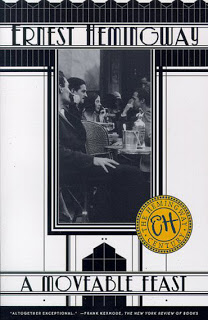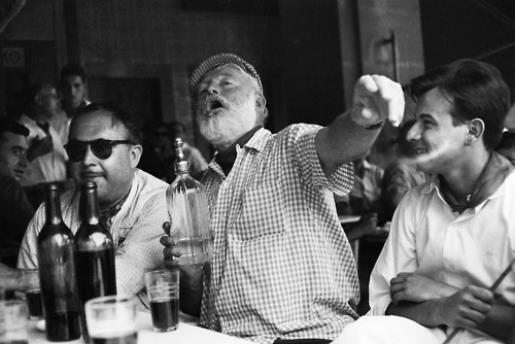 After the intensity of Salem’s Lot and The Ocean at the End of the Lane, I needed something more calm and grounded. Enter Hemingway, who is always safe. (Though I don’t particularly like two of his novels, they never make my head feel like it’s going to explode.) A Moveable Feast has been on my list for quite a while, and I’m not sure why I hadn’t read it until now. I think it’s the fear of the non- in front of the fiction part. At the beginning, Hemingway says you can treat it like fiction, but I’m sure that at least most of the stories are true. So we’ll call it a memoir.
After the intensity of Salem’s Lot and The Ocean at the End of the Lane, I needed something more calm and grounded. Enter Hemingway, who is always safe. (Though I don’t particularly like two of his novels, they never make my head feel like it’s going to explode.) A Moveable Feast has been on my list for quite a while, and I’m not sure why I hadn’t read it until now. I think it’s the fear of the non- in front of the fiction part. At the beginning, Hemingway says you can treat it like fiction, but I’m sure that at least most of the stories are true. So we’ll call it a memoir.
It’s about Hemingway and the Lost Generation in Paris in the 1920s, living and writing. He details time he spent with Gertrude Stein and F. Scott Fitzgerald, among others, and how he lived cheaply before he became famous for his novels.
He describes Gertrude Stein just as I’d expect her. I’m not a fan. I don’t like her poetry, and it seems to me that she wasn’t a great artist, but her value lies in opening the path for other artists. Here’s a good example of poetry that I don’t like – and an excerpt from “New”:
We knew.
Anne to come.
Anne to come.
Be new.
Be new too.
Anne to come
Anne to come
Be new
Be new too.
And anew.
Anne to come.
Anne anew.
Anne do come.
Anne do come too, to come and to come not to come and as to
and new, and new too.
UGH. Okay, I know she was a high Modernist and was experimenting with language and so on, but UGH. She reminds me of a certain local artist who also makes me say UGH. Thank God Instagram didn’t exist back then.
Moving on. Hemingway also describes a trip he took with Fitzgerald to Lyon to pick up a car he and Zelda had left there. Fitzgerald can’t hold his alcohol, and trouble ensues. They get back, Hemingway reads The Great Gatsby, and says that he’ll deal with whatever Fitzgerald does because that novel is so good and he knows Fitzgerald can write something even better.
I really enjoyed A Moveable Feast. I gained insight not only into Hemingway’s life, but into the lives of the Lost Generation in Paris. It’s more personal and real than biographies and histories written after the fact, and that makes it oh so much better.
Bonus: Here’s a picture a drunken Hemingway, though it was taken many years later.
